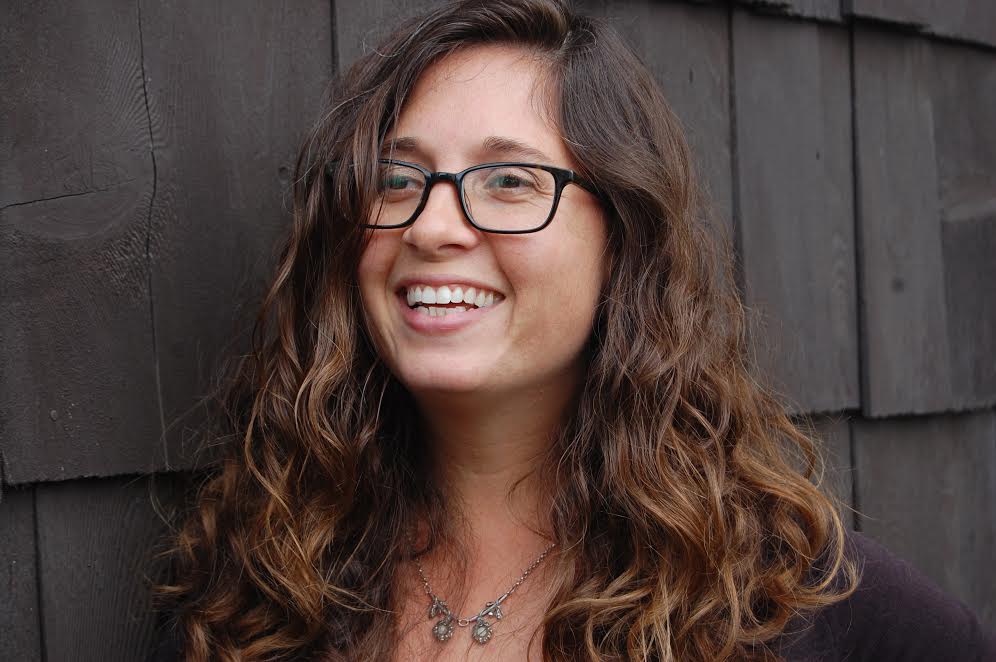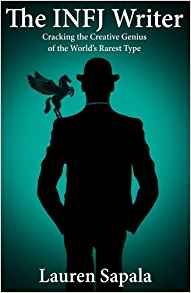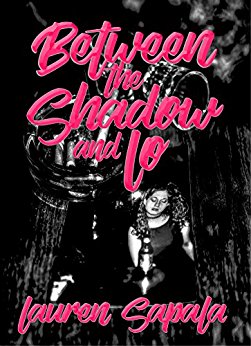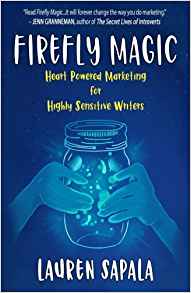 I’m launching a new blog feature today called, Interviews with Creatives! I love chatting with fellow writers, artists, and makers, and learning from them–and thought you might too.
I’m launching a new blog feature today called, Interviews with Creatives! I love chatting with fellow writers, artists, and makers, and learning from them–and thought you might too.
This month, I had the pleasure of interviewing Lauren Sapala, author, blogger, and writing coach. I’ve been following Lauren for a couple of years on Twitter and have found her to be a fount of advice on writing and the writing life. After reading her book The INFJ Writer and loving it, I wanted to know more about her and how she writes.
Peg: What motivated you to start your blog?
Lauren: Well, I had started a writing program in Seattle in 2009, and then when I moved back to San Francisco in 2010, I opened another branch there. As I was running these groups I noticed that the writers who showed up seemed to suffer from the same kind of writing problems I did—self-doubt, a lot of strong fear about showing anyone else their work, and sometimes, crippling writer’s block.
Week after week, I ended up counseling these writers and helping them overcome these problems, but because it was an in-person group, I only had so much time and energy. So, I could only help a handful of writers at a time. I thought of starting the blog because I knew it would be a way to reach much larger numbers of writers, and it wouldn’t be dependent on my physical presence to do so. That led to me starting my blog in 2013, and I’m still going strong with it today.
P: I like how your blog manifested from an actual situation. You saw a need and started your blog as a way to help other writers who weren’t in your in-person writing groups. That’s so great and so smart. When you first started blogging, how did it feel to have your writing out in the world?
L: My first two years of blogging were really tough. It wasn’t the learning curve of using the technology or getting into a regular posting routine, it was finding my own voice as a blogger that was so challenging.
I started out trying to do what all the other writing bloggers were doing, because I thought that was the road to success, and also, because I was scared of being “too much me” and being rejected by readers. So I wrote on topics that were very middle-of-the-road, had mass appeal, and didn’t rock the boat.
After about two years of this, I started to feel a much stronger pull to write on topics that I, personally, was very interested in, even if they weren’t apparently linked to writing—like limiting beliefs, personal growth, and personality and psychology. Funnily enough, the more I explored what truly interested me, the more I discovered that all of these topics DID lead back to writing, and the more readers I attracted who were on my same unique wavelength.
Those first two years were also a challenge because I was so hyper-focused on the blog as well. I was constantly checking my numbers and looking to see if anyone new had subscribed. If someone didn’t like a post or made a snarky comment, I felt crushed. I spent a lot of time looking for ways to promote the blog, and I also felt that it was mandatory that I post at least once a week. Now that I’ve been blogging regularly for five years, I’ve relaxed A LOT more about the whole thing. I never check my numbers, I ignore all snarky comments, I don’t really promote at all, and if I miss a week or two, oh well. It’s made blogging a MUCH more pleasurable process.
P: I know what you mean! I thought the same thing when I started my blog, but stressing about all these things made me want to blog less, not more. I’m glad you put that stuff aside and it made blogging a lot more pleasurable. How do you balance blogging with writing books?
L: This is a really hard question because I don’t have any easy answers. I live a busy life. A lot of people who only see me online assume that being a writer is my full-time job and I have oodles of free time to write and teach and work on publishing, etc.
The truth is that I still have a full-time day job (executive assistant at a startup company), and I also have a three-year-old son at home. I’m very lucky in that my husband is a fulltime stay-at-home dad—he is my rock and my support in everything. But, I’m still super busy. I blog, I coach other writers, I work on my own writing, I edit and beta read, etc.
The key I’ve found to balancing it all is being ruthless in eliminating other activities that only serve as “time fillers.” So, for instance, I watch no more than 45 minutes of TV per day, and that 45 minutes is only to spend time with my husband in the evening after our son has gone to bed. I don’t read the news, period. I spend very little time on social media. I only check my cell phone a few times a day and I don’t have social media enabled on my phone.
Basically, I’m extremely aware of activities that suck time away from me, bit by bit, and I don’t engage in them whenever possible. If I have an hour or 30 minutes unexpectedly free, I read a book or I go for a walk to think about my writing ideas. If I take public transit to commute, I read a book or work on writing ideas. Whenever I’m in a situation with a bunch of other people who are standing around and scrolling through their phones, I read or work on ideas. I’ve found that cutting out TV, most of the internet, and unnecessary texts from other people, and then filling that time with reading and ideas goes a long way toward helping me meet goals much, much faster.
P: I love how ruthless you are with cutting out time fillers. You’re inspiring me to figure out ways I can cut more out of my life too. I understand now how you carve out time to write, but how do you motivate yourself to write regularly?
L: Currently, I don’t have one method I use. I think the tricky thing about this is that so many writers have trouble motivating themselves to write, and we assume that there must be some strategy or method to get past that.
In my opinion, it really comes down to the writer and what is going on with them in their individual life. For instance, back in 2006 when I joined my first writing program, I had HUGE problems writing. I had to join that program to show up somewhere once a week and write silently for an hour with other people, because I just couldn’t do it on my own. However, at that time I was 28 years old and coming off seven years of alcoholism. In terms of being able to check in with myself internally and use my own internal signals to drive my life forward, forget about it. I just wasn’t there. That’s why I needed that writing group so badly, because I needed the support of other writers to help me along the way.
Now, in my current life, I still greatly benefit from the support of other writers, but I am much more internally directed and skilled at listening to my own intuition and what I know is right for me. So, consequently, I’m engaged in many projects that pull me to work on them. I don’t need to prod myself in any way to write anymore. This is also, incidentally, what I work on with writers when I coach them: cultivating their own unique rhythm, voice, and consciousness as a writer so that they can become internally-directed as an artist and write the things they truly want to write and that mean the most to them.
 P: Over time, you turned your writing into a habit. I’m glad you followed your intuition, and it led you to do what was right for you. Speaking of which, your book, The INFJ Writer, helped me so much in understanding why I write the way I do, and how following my intuition would help me to be a more productive writer. What did it feel like to publish your first book and put it out there for people to buy?
P: Over time, you turned your writing into a habit. I’m glad you followed your intuition, and it led you to do what was right for you. Speaking of which, your book, The INFJ Writer, helped me so much in understanding why I write the way I do, and how following my intuition would help me to be a more productive writer. What did it feel like to publish your first book and put it out there for people to buy?
L: Publishing The INFJ Writer was half terrifying and half totally okay.
It was terrifying because it was my first book and I had no idea what people would think of it. I had never experienced getting reviews, looking at sales figures, or anything else that came with publishing a book, so everything felt new and scary. However, it was also totally okay because I had been coaching writers for about three years at that point and I had talked to so many writers who were having the exact same very specific problems with writing.
At that time, almost all of my clients came to me through finding one of the articles I had written on INFJ and INFP writers on my blog, and then when I started coaching them, this same set of problems reared its ugly head. So, I knew there was a solid connection and I knew it was no coincidence that all of these INFJ and INFP writers were going through the same things. I was confident that if the right readers found my book it would be helpful for them.
 P: You’re right. I’m glad you realized that connection. Whenever I meet a writer that’s a NF type on Myers-Briggs, I recommend that they read your book. Your second book, “Between the Shadow and Lo,” is very different from your first book. First, it’s fiction, and second, it’s based on your years as an alcoholic in your 20s. How did you decide to let people know it was based on your life rather than letting it be known as a work of fiction?
P: You’re right. I’m glad you realized that connection. Whenever I meet a writer that’s a NF type on Myers-Briggs, I recommend that they read your book. Your second book, “Between the Shadow and Lo,” is very different from your first book. First, it’s fiction, and second, it’s based on your years as an alcoholic in your 20s. How did you decide to let people know it was based on your life rather than letting it be known as a work of fiction?
L: This might sound odd, but my past as a crazy alcoholic is actually something I value highly. I learned A LOT from that experience, it was very significant in helping to shape the person I am today. So I wanted to own it. Additionally, authors like Jack Kerouac, Jean Genet, and Charles Bukowski are some of my biggest influences and I wanted to emulate what they did in their writing. The idea of a book that is truth, but also fiction, but also memoir, but also pure story, really appeals to me.
P: Owning your past experiences is so powerful. I’m glad you owned it and ran with it. Your third book, which just came out, is called, Firefly Magic: Heart Powered Marketing for Highly Sensitive Writers. How did you decide on this topic for your third book?
 L: Firefly Magic was born much the way that The INFJ Writer was born, from my experiences with my clients. In the past few years, more and more of my clients have decided to go the self-publishing route, and they have run into the same mental obstacles I have run into myself through self-publishing. Namely, that you have to learn how to market your work but the whole concept sounds intimidating, overwhelming, tedious, and like something awful that you just would rather not do.
L: Firefly Magic was born much the way that The INFJ Writer was born, from my experiences with my clients. In the past few years, more and more of my clients have decided to go the self-publishing route, and they have run into the same mental obstacles I have run into myself through self-publishing. Namely, that you have to learn how to market your work but the whole concept sounds intimidating, overwhelming, tedious, and like something awful that you just would rather not do.
When I first decided to learn about marketing. I challenged myself to sift through the business shelves at the library and check out every book that looked like I would absolutely hate it. Well, I was really surprised. Because with almost every book that I thought I would “really hate,” I found some kind of insight that changed my thinking.
I thought about all my clients and the way they felt about marketing. I knew if they started reading the books I was reading, their way of thinking would probably change bit by bit, just like mine was. But, I also knew my clients—the highly sensitive, intuitive, creative, introverted dreamers and poets of the world—were not about to start going to the library in droves to check out these very traditional business books.
So I thought, “Well, what if I wrote a book about marketing, showing my tribe (all the highly sensitive writer folks out there) what marketing could be like if they thought about it differently?”
That was how the idea was born, and then when I started writing it, the book took on a life of its own. My biggest goal with this book was to write a marketing book that is NOT boring, that is easy to read, and that is also enjoyable to experience. Hopefully, I’ve succeeded!
P: I bet you did, and I can’t wait to read it. Congratulations again! So, here’s my last question, and it’s an important one. How do you reward yourself after you finish writing a book?
L: It’s funny you ask this, because I make it a big point with my clients to teach them to reward themselves when they hit writing milestones. It’s very important to celebrate in some way in order to acknowledge your work and nurture your self-esteem. When I finish a book, I go out for lunch at my favorite sushi place with one of my best friends. We order way too much food and spend hours just talking. It’s divine.
P: I love that. Your reward includes two things that you enjoy: sushi and time with a good friend. It’s a great tip for us all to give ourselves rewards that really match who we are and what we like, and not what others define as a “real” reward.
Thank you, Lauren, for your time and all your honest, thoughtful answers. You’ve inspired me all over again. I love your writing and can’t wait to read Firefly Magic and all your future books!
Lauren Sapala is the author of Firefly Magic: Heart Powered Marketing for Highly Sensitive Writers, a guide to help any HSP, INFJ, INFP, or introvert writer move past resistance to selling and marketing their work. She is also the author of The INFJ Writer, a writing guide made specifically for sensitive intuitive writers. She currently lives in San Francisco.
If you enjoyed this interview, sign up for Lauren’s newsletter, follow her on Twitter and Facebook, and check out her books!
Peg Cheng is the author of The Contenders, a middle-grade novel that asks, can enemies become friends? She is currently writing another novel that is a re-imagining of the Snow White fairy tale set in 1980s Seattle. Peg is also the creator of Fear & Writing, a workshop for procrastinating writers from all walks of life.
Hi Peg,
This interview was like a healthy turkey sandwich with the right amount of veggies and mayo. So, satisfying. I’m a fan of both you and Lauren, so you two together were a perfect combination. The questions were great and the answers insightful. I enjoyed every bite (oops! bit) of it. Thanks!
I love your sandwich metaphor, K! It made me smile when I read it. It also made me feel really good. So glad our interview left you feeling deliciously satisfied. 😀
Nice!
Lauren deserves many more of these 🙂
Thank you. Yes, she definitely does.
My impression of Lauren from reading The INFJ Writer was that of a nurturing presence. Reading about her “ruthlessness” towards distractions, her willingness to tackle “boring” business books, and her short list of writing heroes, I see there’s an edge to her, too. I think if you put her on a coat of arms, she’d have a heart-shaped box of chocolates in one hand, and a sword in the other.
This series is a good idea, looking forward to more interviews!
Edgy, I love your coat of arms image of Lauren with a heart-shaped box of chocolates in one hand, and a sword in the other! Compassionate and supportive, yet badass too. That’s Lauren.
I’m so glad you enjoyed the interview. Looking forward to bringing you more in the future.